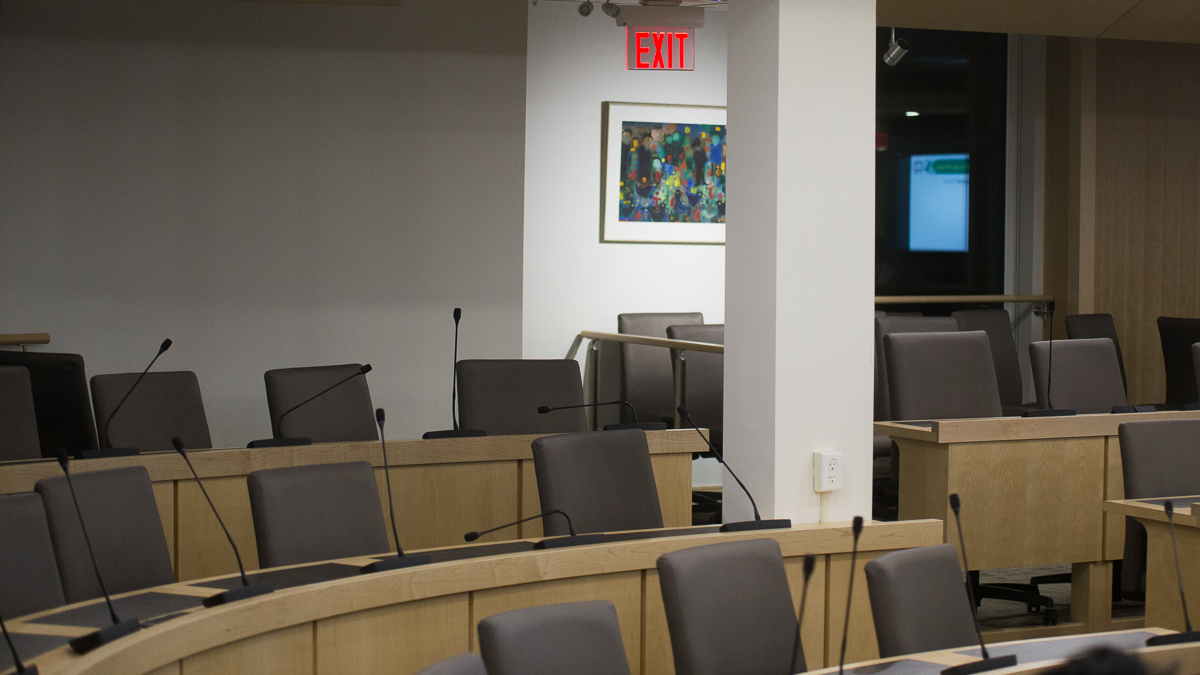Notes from Council: plans for the future of Students’ Union, how COVID-19 will affect finances
 Rosty Soroka
Rosty Soroka“Notes from Council” is The Gateway’s ongoing series of recaps of noteworthy items from Students’ Council meetings.
While COVID-19 has thrown a wrench into projected earnings for Students’ Union owned and operated businesses, future prosperity might be on the horizon.
Marc Dumouchel, general manager of the Students’ Union, gave two presentations on the state of the union and the state of the union’s finances at an additional council meeting on September 29.
SU Perks—an app for gamifying student involvement—named as potential revenue generator
One goal for the coming year Dumouchel shared is increasing engagement among students who do not typically follow SU activities.
“How do we gamify student involvement?” he asked.
He said the answer could involve expanding SU Perks, an experiential app that began as a student project. The app acts as an engagement and loyalty platform for the Students’ Union and SUB businesses.
Dumouchel noted that the app would likely lead to brand involvement opportunities, providing an additional stream of revenue.
He also cited the potential for a loyalty program alliance across the country.
“There are commercial entities that have student pricing, the student discount, the student price card,” he said. “Why the hell is some external company monetizing students when we can do it better? That money would then get used for what students want it used for, and we can control how heartfelt it is, that student attention and interests are respected.”
Myer Horowitz renovation could garner six figure earning potential, Dumouchel reports
In addition to expanding apps for students, Dumouchel also mentioned the renovated Myer Horowitz centre as a large potential generator of new revenue and growth, beginning around 2022.
“I really do think it’s going to be a six figure profit generator in two years,” he said.
Law councillor Karl Buchanan brought up a past experience using a government grant to equip a performing arts venue with an assisted hearing system as something worth considering during the development process.
“Is that something that is still available, and if so, is it being looked into for the Horowitz space?” he asked.
Dumouchel responded that grants covering accessibility initiatives would be a good fit for the project.
“If that exists, we’re absolutely going to try for that because one of the things that we’ve added to the theatre program is ensuring that there are alternative audio options for accessibility purposes,” he said.
While the theatre is the most major renovation in the works at the moment, SUB is being updated to better meet student needs. For example, Dumouchel says maternity pods will be available for students sometime this year.
SU seeing “dark shadows on horizon” post COVID-19, but long term prosperity
While business expenses were down 60 per cent as a result of COVID-19, revenue generated by Students’ Union businesses like SUBmart, RAT, the Daily Grind, and the Print Centre were down about 80 per cent.
“Instead of making half a million dollars on our businesses next year, we’re expecting to lose almost a million dollars,” Dumouchel said. “That’s a difference of 1.5 milion dollars that we have to find a way to make up.”
Despite this unforeseen deficit, according to Dumouchel, the Students’ Union will be eligible for two subsidies: the Canada Emergency Wage Subsidy program, and the Tennant subsidy, garnering $2 million and $160,000 respectively.
Dumouchel noted that while the Students’ Union is not financially at risk this year, when subsidy programs end and business does not return to full capacity, prospects could become worrisome.
“What I can say is that at this point the Students’ Union is not in any financial crisis, but there are dark shadows on the horizon that we have to be aware of,” he said.
The university’s target to increase enrollment by 20 per cent was cited by Dumouchel as something that could assist the Students’ Union’s long term, in addition to pre-existing plans regarding the Myer-Horowtiz theatre as a potential six-figure revenue generator.
“We have great potential going forward, I’m not worried,” Dumouchel said. “I’m a little concerned about this year and the year after because I think it’ll take time for the recovery to set in. We’re also in Alberta, which is in a state of constant recession right now because of the decline in oil and gas.”
On the topic of student fee reduction, Dumouchel said the projected long term prosperity he sees for the Students’ Union might lead to some fees being alleviated, but not all.
“I can’t expand student service and get rid of all the fees,” he said. “I think if we commercialize some things, it is feasible that in a 15 to 20-year timeframe we can get to a point where we can reduce our reliance on fees.”
“We’ll never get rid of fees completely, because we have a building to maintain. We can get our fees back down, but the only way we’re going to do that is if we act in truly innovative and aggressive ways to generate revenue that doesn’t rely on students.”




